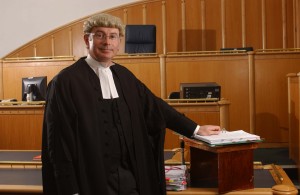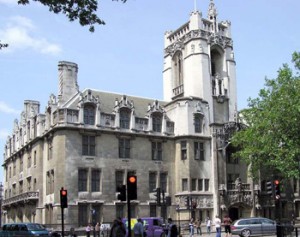Law Weblog
Drink drive judge resigns
Wednesday 23 September 2009 at 9:47 pm | In News | Post CommentHis Honour Bruce Macmillan, 63, a Crown Court circuit judge since 1993 in Liverpool, who was allegedly drunk in charge of a motor vehicle has today, resigned.
David Lace was the killer of Teresa de Simone: confirmed by DNA
Saturday 19 September 2009 at 10:22 pm | In News | Post Comment
Lace, a petty criminal and drifter from Portsmouth had been tormented by his crime, the knowledge that an innocent man was in prison for it and by the refusal of police to accept his confession. He cut his wrists, took an overdose of painkillers finally suffocating himself with a plastic bag. In the weeks before his suicide, he gave up work and gave away his possessions.
It was not until 17 September 2009 that the police publicly identified him as the killer.
The police exhumed Lace’s body to match his DNA to the murder of Ms de Simone; the match was a “billion-to-one” confirming Lace was the killer and proved beyond any doubt that Sean Hodgson was the victim of an injustice.

Lace’s body was the third to be exhumed to obtain DNA; the first was that of Joseph Kappen in 2001 who had killed three young women in 1973. Hanratty was dug up in 2002 to prove he had killed Michael Gregsten.
Over twenty years after Lace’s death, Mr Hodgson again appealed this time DNA evidence ensured his acquittal. The murder inquiry was reopened.
Material from the 1979 crime scene gave the Forensic Science Service a profile that narrowed the search for her killer down to 30,000 records on the national database
Old-fashioned detective work involving examination of old case files and tracing people who gave statements 30 years ago led police to a relative of the killer, David Lace.
Mr Hodgson is in poor mental and physical health and needs regular medication and psychiatric care.
Mr Hodgson’s solicitor will seek compensation for his client, which will be capped at £1million, minus a charge for the accommodation and food ‘enjoyed’ by Mr Hodgson during the last 27 years.
His Honour Bruce Macmillan on a second drink-drive charge?
Saturday 19 September 2009 at 10:04 pm | In News | Post CommentPolice again arrested His Honour Bruce Macmillan, 63, this time in Hill Street, Liverpool, on Thursday for allegedly being drunk in charge of a motor vehicle. He is on bail for a similar charge less than month ago.
The judge, who sits at Liverpool’s Crown Court, will appear before Chorley magistrates on September 30 to face the original drink driving charge.
Police first arrested him on August 27 after he drove his Vauxhall Signum on the M6 in Lancashire allegedly over the limit.
Barrister Mark Saunders – fatal shooting no prosecution
Saturday 19 September 2009 at 11:28 am | In News | Post Comment
Charges of murder, attempted murder and manslaughter would not succeed against the officers because there was no evidence that any of the seven who fired 11 bullets did not honestly believe that they were acting in self defence, defence of a colleague or protection of the public because they were in immediate danger.
Charges of gross negligence and misconduct, and health and safety charges against those in charge of the operation could also not succeed in court.
The Independent Police Complaints Commission (IPCC) investigated the shooting but did not interview the officers involved in the incident, instead relying upon their written accounts of the shooting, because authorised firearms officers are treated as witnesses rather than as suspects. They will make public their report after the inquest.
A High Court challenge has paved the way for significant changes to the police practice of pooling notes after firearms incidents.
Jurors and the difference between right and wrong
Friday 11 September 2009 at 6:49 am | In News | Post Comment
The legal standard for dishonesty found in R v Ghosh is whether a defendant’s actions were honest according to the standards of reasonable and honest people, but research has shown that this test may create inconsistency.
Online research of more than 15,000 volunteers by Emily Finch and Stefan Fafinski, of Brunel University suggests that no such universal standard for honesty exists.
The study found that women are more likely than men to see actions as dishonest, but men are more likely to convict. For example, 92 per cent of women thought that it was dishonest to make an insurance claim for pre-existing damage to a car, compared with 85 per cent of men. Only 47 per cent of women, however, would be prepared to convict somebody of fraud on this basis, compared with 55 per cent of men.
Older people are more likely to take a tougher line and people are less likely to consider an action dishonest if they have done it themselves.
Respondents were asked about insurance fraud, student plagiarism or theft from an employer. Even in apparently cut-and-dried cases, more than 3 per cent felt that it was not dishonest to take a DVD from a shop without paying for it.
Further researcher will take place in a mock courtroom to see if the presence of a judge and barristers and peer pressure in the jury room influence decisions.
Judges’ training
Saturday 5 September 2009 at 9:57 am | In News | 1 Comment
Three years ago a review of judges’ training needs was undertaken by Dame Professor Hazel Genn, now Dean of the Law School at University College London.
Its two main conclusions were that training needed to be far more tailored to the needs of individual judges, short of giving one-to-one tuition. Second, the focus of training should be on practical skills, or judgecraft, not the substantive law.
The analysis also said that that far more teaching could be done online, judges could embrace the electronic age and e-learning.
The review also highlighted concern that judicial training in England and Wales was thin compared with other jurisdictions such as Canada. Judges here are trained when appointed and after that they have perhaps two to three days a year. Now it will be four days, three of which will be residential, plus lectures and e-learning,
Another key element is management skills. When the Constitutional Reform Act 2005 made the judiciary an independent arm of the constitution, judges became responsible for a whole host of administrative activities, such as deployment and welfare. Increasingly they have to manage other judges, chair committees and undertake a host of activities other than judging in court.
The original plan would have cost more than £3 million a year, now, it will cost less than £1 million a year.
High Court judges are able to attend the training seminars and the Judicial Studies Board has proposed that new High Court judges have five days’ training in their first year and at least two days a year after that. The board is drawing up training plans with the High Court judges and a three-day residential course in serious crime will be tested this time next year.
Judges will be better able to manage their cases, assess witnesses’ credibility, make correct decisions and provide sound reasons. They will also become confident in dealing with a range of people and with unexpected events. And they would deliver judgments that were well-reasoned and comprehensible and sentencing remarks and summings-up better tailored to the facts of a case. In all these ways the administration of justice will be enhanced.
Transsexual prisoner to move to a female prison
Saturday 5 September 2009 at 7:54 am | In News | Post Comment
A transsexual killer who also tried to rape a woman must be moved to a female prison.
Holding her with men breaches her rights. The prisoner, has obtained a High Court ruling that keeping her in a male prison is a violation of her rights.
The 27-year-old inmate, was originally convicted of manslaughter in 2001 and jailed for five years.
Less than a week after her release on licence two years later, she attacked a shop assistant, forcing her into a back room, tied her up with a suspender belt and tried to rape her.
She was given a life sentence for that offence under a “two strikes” system following the manslaughter conviction.
Full story in The Telegraph here.
Famous Liverpool judge on drinking and driving charge
Monday 31 August 2009 at 9:55 pm | In News | Post Comment
He has sat on the Northern Circuit since October 1993, in 2007 he denied “Purple Aki” (Akinwale Arobieke) his appeal against an interim sexual offences prevention order stopping him from touching boys’ muscles.
Trainee barristers offered £60,000 a year, solicitors £18,000
Thursday 6 August 2009 at 10:59 pm | In News | 2 Comments
One set of chambers, in the ‘magic circle’, will pay pupils a salary equivalent to an MP to lure the best.
Meanwhile, as of 1 August 2009, the minimum salary for trainee solicitors working in Central London is £18,590 pa. For trainees working elsewhere in England and Wales, it is £16,650 pa.
Law Society details here
House of Lords closes on controversial note
Friday 31 July 2009 at 4:48 pm | In News | Post Comment
Supreme Court (House of Lords)
Keir Starmer, the director of public prosecutions, must “promulgate” a policy stating in which circumstances he would prosecute in assisted dying cases, according to yesterday’s Law Lords’ ruling.
Debbie Purdy, 46, who suffers from multiple sclerosis, had asked the House of Lords to order prosecutors to say whether they would charge her husband if he took her to the Swiss clinic Dignitas.
The Lords ruled that the law on assisted suicide interferes with the right to respect a private life under the European Convention on Human Rights, their ruling was unanimous.
This does not open the gates to assisted suicide; it is possible that the prosecuting authorities will draw up guidelines to prosecute a family member who assists another as has been happening in increasing frequency
One of the most high-profile assisted suicide cases concerned the former BBC music conductor Edward Downes and his wife, Joan Downes who died together at the Dignitas clinic earlier this month.
Not one of the 115 people reported to have assisted people to kill themselves at Dignitas has been convicted of assisting a suicide.
The CPS has stated that an interim policy would be in place by the end of September, followed by a public consultation on permanent rules, which could be ready in the first half of next year.
The ruling was the last by the Law Lords who start their summer recess today. The House of Lords Judicial Committee will be replaced in October by the Supreme Court. Over 600 years of British history and tradition ended with the decision. The House of Lords has been operating as a court since 1399. Prior to that the full Parliament could weigh cases. While the House of Lords has kept separate judicial and legislative functions since 1876, the two were not physically divided.
Powered by WordPress with Pool theme design by Borja Fernandez.
Entries and comments feeds.
Valid XHTML and CSS. ^Top^